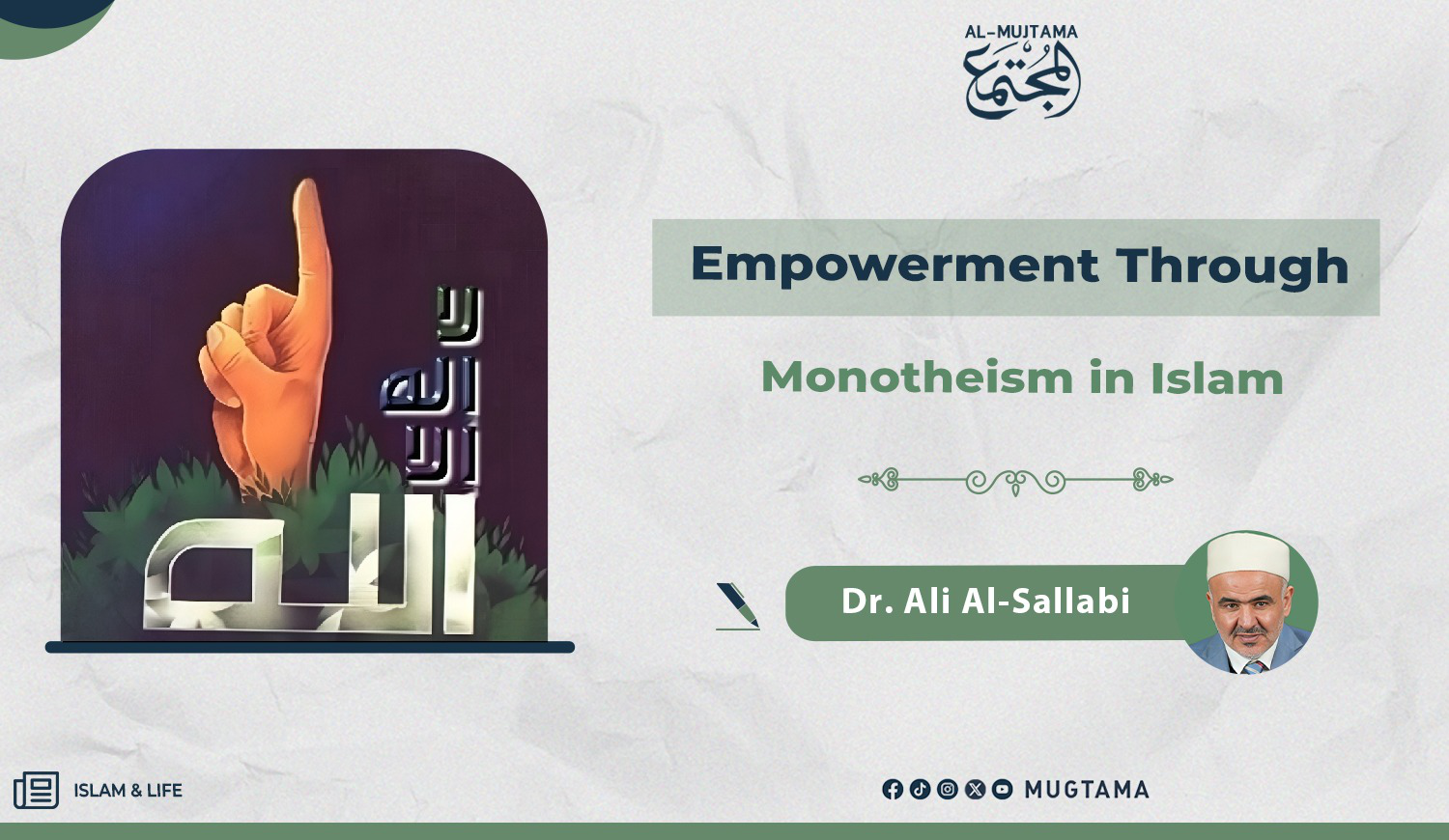Empowerment Through Monotheism in Islam

Fighting Shirk as a Condition of Empowerment
Among the important conditions of
empowerment is fighting associating partners with Allah (shirk) in all its
forms and types. Therefore, the Muslim community that seeks to implement the Shariah of Allah must know the reality of shirk, its
dangers, its causes, the evidence of its falsehood, and its categories. It must
also purify its ranks from shirk through all legitimate means. A person cannot
guard himself against shirk or warn
others about it unless he identifies it and its dangers.
The Benefits of Knowing Shirk
Knowing shirk and what relates to
it has many benefits:
- A person can avoid falling
into it.
- He can warn others from
it.
- The beauty of Islam and
monotheism becomes clear. For when one recognizes the falseness of shirk, he
understands that its opposite monotheism is the greatest of deeds, as by
opposites, things are distinguished.
For these reasons and more,
sincere callers to faith, dedicated scholars, and righteous leaders have paid
great attention to explaining shirk, its divisions, causes, dangers, and all
that relates to it. They clarified that achieving true faith is only possible
when shirk is abandoned and distanced from completely.
Sheikh As-Sa`di said: “Monotheism
of worship is not complete until the servant devotes all of his intentions,
words, and actions sincerely to Allah, and abandons major shirk which
contradicts monotheism entirely. This is when one directs any form of worship
to other than Allah. Achieving complete monotheism also means abandoning minor
shirk, which includes all means that lead to major shirk, such as swearing by
other than Allah, minor acts of showing off, and similar practices.” (1)
The reality of shirk with Allah
is to worship a created being the way Allah is worshiped, or to revere it the
way Allah is revered, or to direct to it a type of the exclusive rights of the Lordship
and Divinity of Allah. (2)
Types of Shirk
Scholars classified shirk into
two main types: shirk in Lordship (rububiyyah) and shirk in Divinity
(uluhiyyah). As-Sa`di said: “Shirk is of two types: shirk in His Lordship,
such as the shirk of the dualists who affirm another creator besides Allah; and
shirk in His Divinity, such as the shirk of the polytheists who worship Allah
but also worship others with Him, equating them with Allah in His exclusive
rights of Divinity.” (3)
Qur’an and Sunnah Warnings Against Shirk
Numerous texts from the Qur’an
and Sunnah warn against shirk, clarify its dangers, and affirm that it is the
gravest sin committed against Allah. The one who commits shirk is the most
misguided, condemned to eternal punishment in Hell, with no helper, friend, or
intercessor to aid him.
Allah Says:
- {Indeed,
Allah does not forgive associating others with Him ˹in worship˺, but forgives anything else of
whoever He wills. And whoever associates others with Allah has indeed committed
a grave sin.} [An-Nisa’ 4:48]
- {Surely
Allah does not forgive associating ˹others˺ with Him ˹in worship˺, but forgives anything else of whoever He wills. Indeed,
whoever associates ˹others˺ with Allah has clearly gone far astray.} [An-Nisa’ 4:116]
- {For whoever
associates ˹others˺ with Allah is like someone who has
fallen from the sky and is either snatched away by birds or swept by the wind
to a remote place.} [Al-Hajj 22:31]
- {It has
already been revealed to you—and to those ˹prophets˺ before you—that if you associate others ˹with Allah˺, your deeds will certainly be void and you will truly be one of
the losers.} [Az-Zumar 39:65]
Many hadiths condemn shirk and
the polytheists, including:
- Abdullah Ibn Mas`ud said: I heard the
Messenger of Allah (peace be upon him) say: “He
who dies a polytheist will enter hell.”
(4)
- Jabir Ibn Abdullah said: I heard the
Messenger of Allah (peace be upon him) say: “He
who met Allah without associating anything with Allah entered Paradise.” (5)
- Abu Bakrah said: We were with the Messenger
of Allah (peace be upon him) when he said: Should
I not inform you about the most grievous of the grave sins? (The Holy
Prophet) repeated it three times, and then said: Associating anyone with
Allah, disobedience to parents, false testimony or false utterance. The
Prophet was reclining, then he sat up, and he repeated it so many times
that we wished that he should become silent. (6)
The Consequences of Shirk in Muslim Societies
The spread of shirk in Muslim societies is a cause of their downfall and deviation from the guidance
of Allah Almighty. Among the greatest injustices and the furthest misguidance is
failing to dedicate worship purely to the Lord of the worlds, and equating the
created with the Creator, the All-Knowing.
Allah alone is worthy of worship.
He is the Owner of benefit and harm. Every blessing is from Him, and none can
repel harm except Him. He alone possesses absolute perfection from every
perspective and complete richness in every regard.
Shirk is distinctive among sins
in that it is not forgiven for the one who dies without repenting from it. As
for other sins, if a person dies without repenting, he remains under Allah’s
Will: if He Wills, He Punishes him, and if He Wills, He Forgives him.
Sins less than shirk have many
avenues of forgiveness: good deeds that erase sins, worldly trials that
expiate, the trials of the grave, the hardships of the Day of Judgment, the
supplication of believers for one another, and the intercession of the intercessors. Above
all is the mercy of Allah, which is most deserving for the people of faith and monotheism.
This is unlike shirk, for the
polytheist has closed upon himself the doors of forgiveness and shut the gates
of mercy. His acts of obedience are of no benefit without monotheism, nor do
trials and hardships avail him anything.
For Further Reading:
- The Moral Role of the State in Islamic Thought
- How Can We Preserve the Islamic Identity in the Global Space?
- Youth… Do Not Take Small Sins Lightly
-------------------------------------------------------------
References:
- Al-Fatawa As-Sa`diyyah by Sheikh Abdulrahman As-Sa`di, p. 13.
- Sheikh Abdulrahman As-Sa`di and His Efforts in Clarifying the Doctrine, Abdulrazzaq Al-`Abbad, p. 178.
- Ar-Riyadh An-Nadirah
wal-Hada’iq An-Nayyirah Al-Zahirah, Abdulrahman Al-Sa`di,
p. 244.
- Muslim, The Book of
Faith, Chapter: He Who Dies Without Associating Anyone with Allah (1/94)
(92).
- ibid.
- Muslim, The Book of
Faith, Chapter: Clarifying the Major Sins (1/91) (143).
- Jurisprudence of Victory and Empowerment, Ali Muhammad As-Sallabi, 1st Edition, At-Tab`in Bookstore, Cairo, 2001, pp. 230–238.











